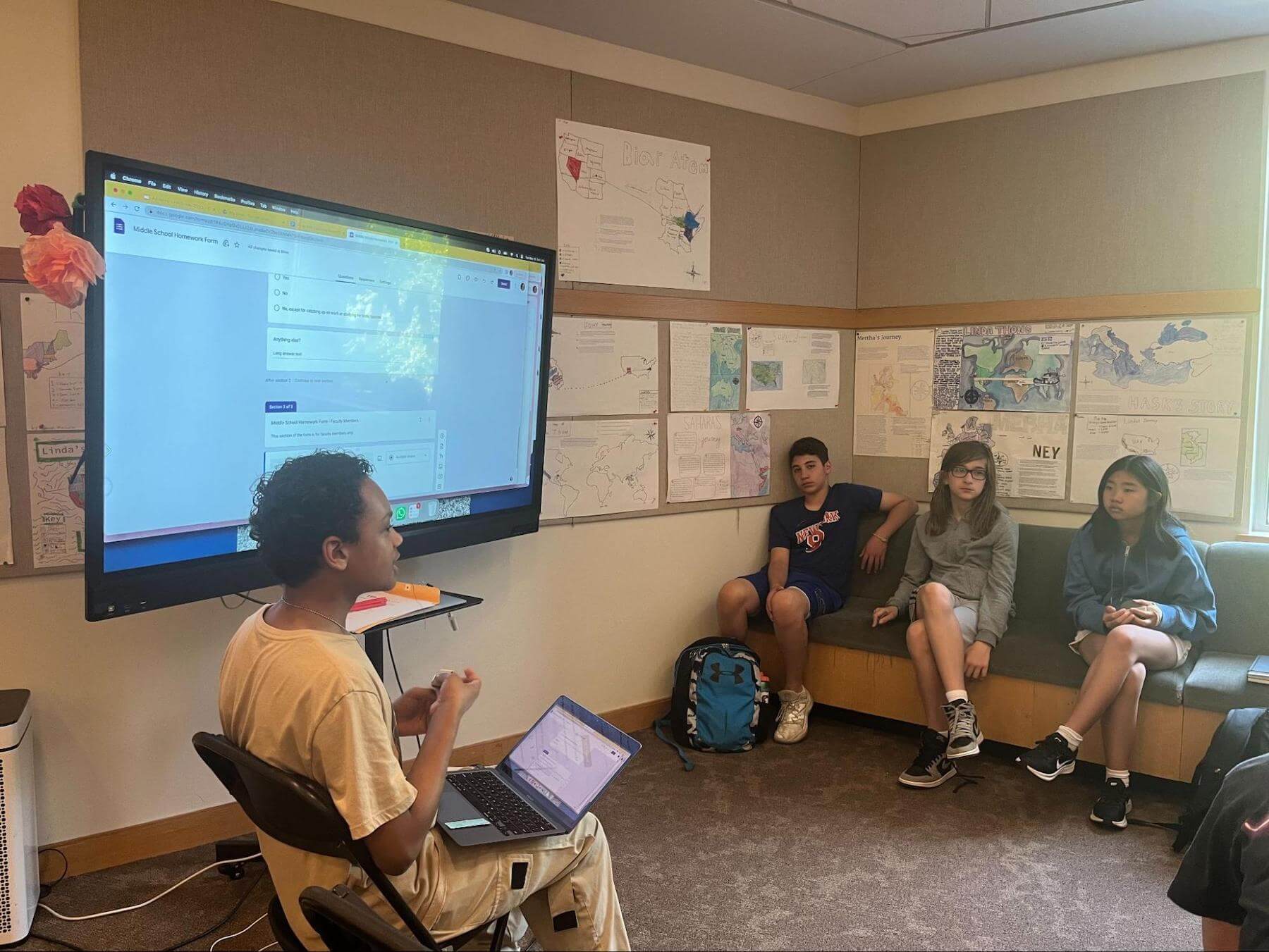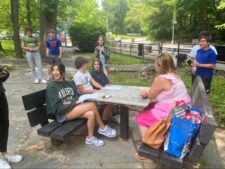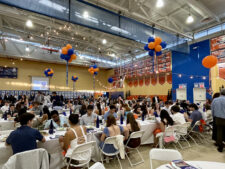The move for change can start close to home, and Fieldston Middle’s 7th Graders are learning this lesson through a capstone project tackling issues within their Ethical Culture Fieldston School community. The assignment challenged students to identify areas of concern that the Fieldston Middle students face and then collaborate with each other as well as faculty and staff to present proposals for improvement.
“The goal of the project is to have students learn how they can be change agents in their community and in their School,” explains English Teacher and 7th Grade Dean Debora St-Claire. “After doing research, the students will write a proposal for change and present it to the School’s administration team.”
Originally introduced to the assignment right after Spring Recess, the 7th Graders have worked with their advisories for nearly two months to analyze different topics related to their everyday lives at Fieldston. Project subjects include inclusive and exclusive clothing, the Fieldston Middle building’s energy efficiency, recess structure, snack availability, and the intricacies of middle school phone usage, homework, schedules, Field Day, and group projects. These ideas stem back to the question St-Claire asked students to consider at the start of the project: “Who am I in our community?”
“It’s stepping outside of yourself a little bit and looking at who we are in the bigger picture in our community,” St-Claire told the 7th Grade during their introduction session, foreshadowing their 8th Grade capstone project that will ask them to question their place in the larger world.
The specific project topics emerged after Fieldston Middle Principal Jon Alschuler hosted several Pizza with the Principal lunches to hear directly from 7th Graders about their middle school experiences.
“In meeting with a number of 7th Grade students for lunch, I was able to hear from them their insightful observations around topics such as grading, class placement, inclusivity, and what drives them to participate or not participate in classes,” Alschuler says. “They began to generate good questions and thoughts on how we could build a better experience for students. Just as when adult groups meet to problem-solve, they did not all agree on the best potential solutions, but it got them all thinking about how to ask questions that can lead to solutions.”
Students identified issues and concerns that St-Claire and History Teacher and Grade Level Coordinator Debra Sands later assigned as capstone topics based on advisories’ interest. In collaboration with Assistant Principal of Student Life Isora Santos, St-Claire and Sands designed the project to incorporate concepts explored across the entire 7th Grade curriculum. Just as they would focus on a fixed idea to write an English essay, advisories finalized a key stance on their topic while contemplating different perspectives. They would also test theories on how to improve situations, like how they form hypotheses in science class, and consult data as they would to solve a math problem or historical dilemma.

St-Claire also emphasized the use of generous listening when groups interviewed various adults for their proposal material. “[This is] really being open to what other people have to say that may not necessarily be in line with what you’re thinking,” she said.
In each advisory, every person fulfilled several roles that contributed to the project’s success, serving as interviewers, writers, graphic designers, or presenters. “Managers” from each group also met weekly with St-Claire and Sands to discuss their progress and help others overcome roadblocks. Students debated how to generate more online survey responses, shared struggles in scheduling interviews, and gave updates on their upcoming presentations. The conversations also reminded students that the finished proposal reflects their team’s work, not singular achievements.

“One thing to remember is that it’s not about the individual,” St-Claire shared with managers during a recent meeting. “It isn’t about the person. You’re an advisory group, and you all worked together towards a common goal.”
From dealing with different personalities to balancing a to-do list, advisory managers have experienced both the pros and cons of sharing a common goal with so many people.
“I have definitely learned that when you are working in a big group, you need to learn that not everyone is going to cooperate,” Alma M. ’28 says. “Sometimes people will argue, and you have to hear what they say.”
“I feel working with such a large group shows the benefits of everyone having a specific job,” notes Ben P. ’28. “It keeps the work organized.”
Using their advisory periods to complete the majority of the project, the 7th Graders formed their key arguments, prepared interview questions, tallied survey answers, and determined how to use their data. In one classroom about three weeks before presentations, an advisor’s message on the board encouraged students to “dig into data,” reading, “This is not about validating your opinions, this is about what the data tells us.” On this day, advisors acted as mediators throughout the 7th Grade hallway, calling groups’ attention to data patterns, miscommunications, and gaps in workloads.

When an impromptu managers’ meeting was announced at the end of advisory, students scurried from their rooms to meet St-Claire in a corner. One 7th Grader announced, “I brought my data!” As the group settled, St-Claire offered the managers checkpoints to discuss with their advisories as project deadlines loomed.
“A big hope we have is for 7th Graders to feel a stronger connection to the community they are in, especially in the spring as rising 8th Graders, and to gain a clearer understanding of how changes are implemented,” says Sands. “In the past, we’ve seen students have legitimate concerns and try to resolve them through petitions. ‘I have a petition!’ or ‘You need to sign my petition!’ was a commonly heard phrase, but there was little thought going into whether the creating and signing of a petition was the appropriate way to address the issue at hand and very little follow through after the creation of said petition. We hope that by having a clearer understanding of how change is implemented, students will feel more knowledgeable and empowered as they move into 8th Grade and especially high school.”
“We hope that as they hone the skills embedded in the project, such as conducting interviews, collaborating, acknowledging other perspectives, and imagining the world as otherwise, they will become advocates and activists for change on an even broader scale,” St-Claire adds.

Capstone presentations in front of the Fieldston Middle administration, as well as some schoolwide administration, will occur in early June. Administrators could potentially accept or edit students’ proposals to implement into future School guidelines. This final step brings the project full circle, showing 7th Graders how their influence and hard work may affect the Fieldston Middle community for years to come.
“This project has taught me that making changes might not be simple, although [it’s] 100% possible,” says Isabella F. ’28. “I find that being able to work for something we collectively agree on will become important in our future life. As adults, we want to be confident and powerful in the ways that we impact others. We are constantly learning something new about our community and its rules, and it’s interesting how, as a 7th Grader, I can impact a schoolwide policy.”



